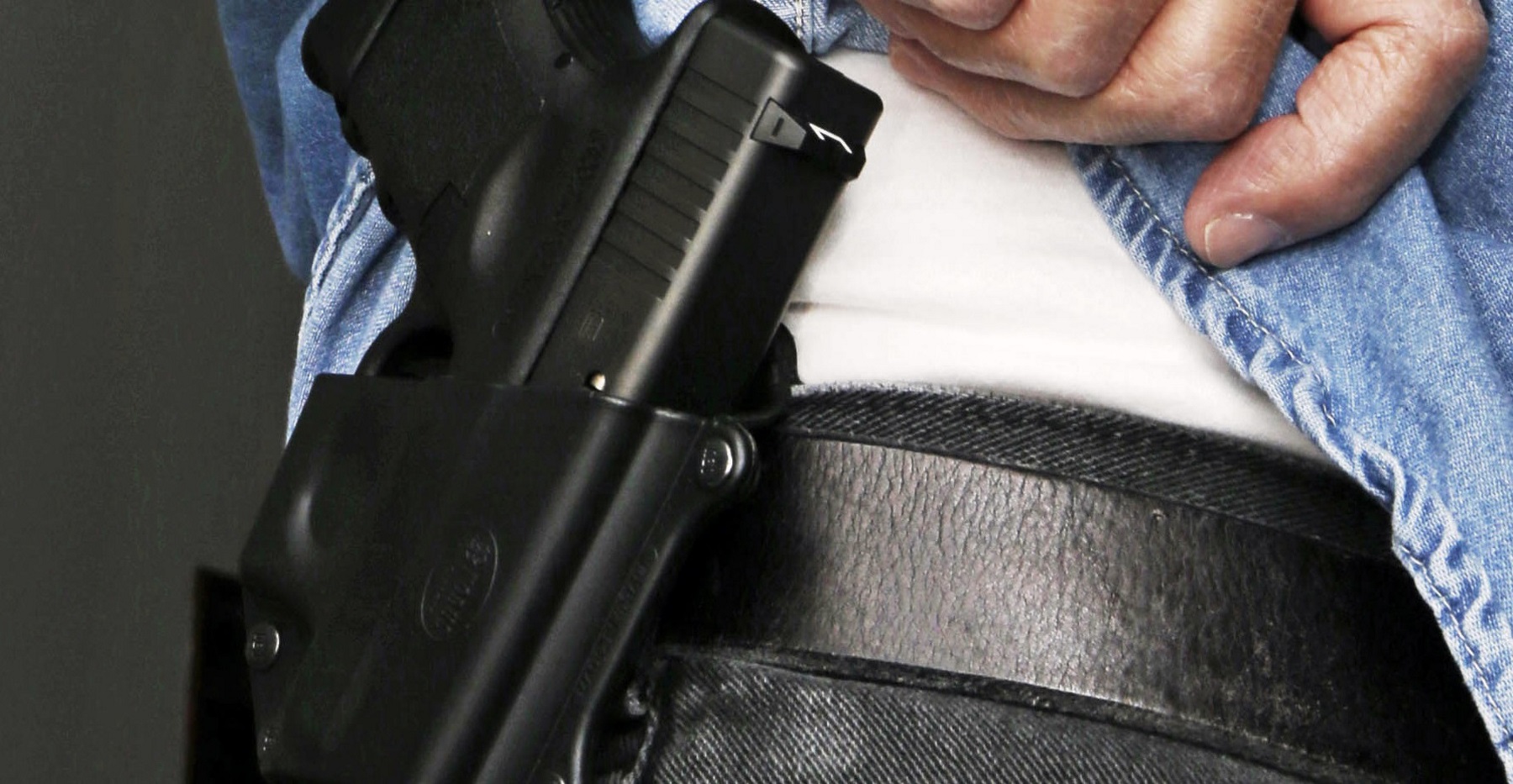How Some With Serious Mental Illnesses Remain Cleared To Buy Guns In Georgia

Only people who undergo “involuntary treatment,” rather than involuntary evaluation, are listed as ineligible to own guns on the National Instant Criminal Background Check System.
Al Behrman / Associated Press file
In Georgia, gun owners with serious mental illnesses can retain their federal gun rights as long as they voluntarily enter treatment when they experience crises. Some argue that leaves a gap open in background check systems that could be dangerous.
Probate judges are responsible for issuing “weapons carry” licenses in Georgia. Athens/Clarke County Probate Judge Susan Tate is the chair of the probate judge council’s weapons carry license committee and used to chair its mental health committee.
Sometimes family members or police come to her concerned about someone they know who has a serious mental illness and who’s in crisis.
“They’re having a psychotic breakdown or a psychotic episode and they’re deteriorating in this downward spiral, and people around them can recognize it for what it is,” Tate said.
In cases like this, Tate can order someone to undergo a mental health evaluation and send a sheriff to temporarily seize their weapons.
“They might spend a few days or few weeks in the hospital and then they get out. They might have two or three days worth of medications and they’re told, ‘Bye bye! Here’s your card. Here’s your medication. Keep your appointment!’” Tate said.
A Long Process
Tate believes both a lack of health care resources and a common misunderstanding about gun laws are responsible for some people falling through the cracks.
“They assume somebody who’s been sent to the hospital for an involuntary evaluation that they’re not able to possess a gun. And whenever I mention this to a mental health professional, without exception, they’re always astounded,” Tate said.
Only people who undergo “involuntary treatment,” rather than involuntary evaluation, are listed as ineligible to own firearms on the National Instant Criminal Background Check System (NICS).
Getting to that point, according to Tate, requires a long process that begins with mental health professionals filing a petition with the court. If, at any time during the process, an individual volunteers to receive treatment, their gun rights remain intact.
“It’s terrifying to me when we see people whose family members, who know something’s wrong, come to us over and over,” Tate said.
In some cases, those family members come every two months. Their loved ones are people who remain legally allowed to, and do, own guns.
One Family’s Story
WABE spoke to one family who has been through this with their adult son. We’re keeping their names private.
The son has gotten treatment, a job and has a more stable life now. His parents don’t want to threaten that or their relationship. But they do want to talk about what happened when their son was struggling and they found out he had a gun.
“It’s just maddening. We want to protect him and others, and our hands are tied,” the father said.
In one case, during a crisis, a judge ordered his son’s guns confiscated. There turned out to be more than just one.
“Probably within five days, we heard from somebody else that he was out, back at his apartment,” the mother said.
Her son was free to get all those guns back and legally purchase more. These parents don’t think their son has any now, but they don’t know.
This family says their son has no history of aggressive behavior. It’s his safety they’re most worried about, as well as the stigma.
“It really distresses me to see how the media treat people with behavioral health concerns, particularly people with mental health concerns regarding violence,” said Sherry Jenkins Tucker, who heads the Georgia Mental Health Consumer Network.
“Those of us that experience mental health concerns and behavioral health concerns are much more likely to, if anything, be victimized versus being perpetrators, and we are not more dangerous than the general population,” Tucker said.
She’s skeptical of the idea that there’s an easy solution here, and she’s not alone.
‘Due Process’
“If we make it to where anybody can report me as being crazy and I lose my firearms, I’ll be reported right away,” said Jerry Henry, with the gun-rights advocacy group Georgia Carry.
Severe mental illness has touched his family, too, so he’s sympathetic, but he’s not for any kind of change that makes it easier to take guns away from someone who hasn’t broken any laws.
“Due process,” said Henry, a mantra for gun-rights advocates.
“There are people that always fall through the cracks and sometimes have horrifying implications, but you can’t make a law to go around and protect this, this, this and this. Unless you want to have Gestapo breaking your doors down all the time, you can’t do that in a free society,” Henry said.
Judge Tate says she understands these concerns. However, she also believes more conversation between mental health professionals and courts is needed. She thinks that education and better coordination could help to prevent suicides, and she pays attention to how these issues have played out in mass shootings elsewhere.
“I think that we have just been lucky in Georgia that we have not had one of these incidents, yet,” Tate said.
Georgia’s policy has already impacted other states. In 2015, John Houser shot and killed two women, and injured nine others in a movie theater in Lafayette, Louisiana. Reporting revealed that a Georgia judge had ordered him to be evaluated at a psychiatric hospital in 2008. Beyond that, he was never involuntarily committed and remained legally able to buy a gun in Alabama, which he allegedly used a year later in the shooting.
WABE reached out to the Georgia Department of Behavioral Health and Developmental Disabilities for this story. A spokesman told us, “We follow the Georgia code with regard to reporting,” and declined to comment further.
This story has been updated.








